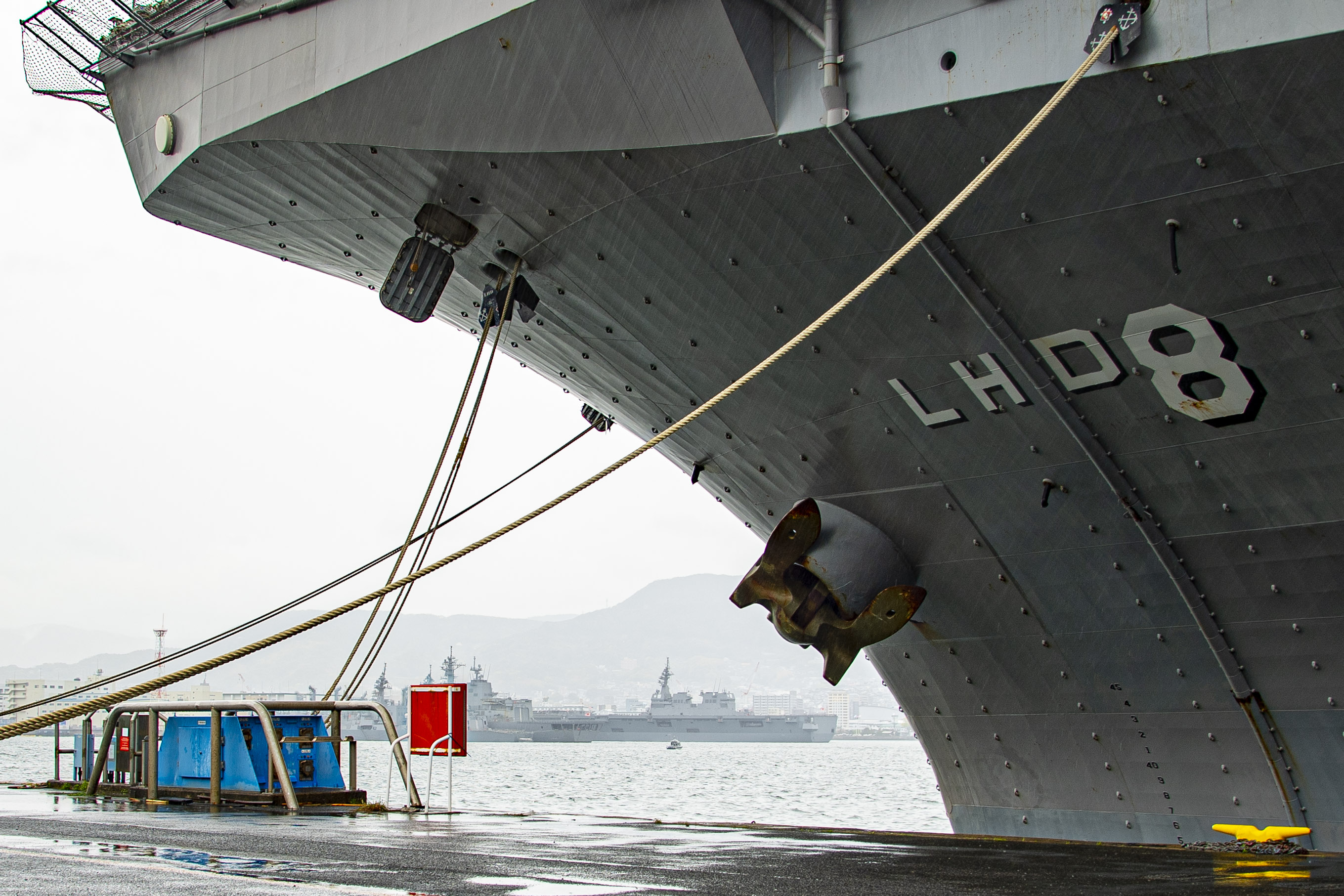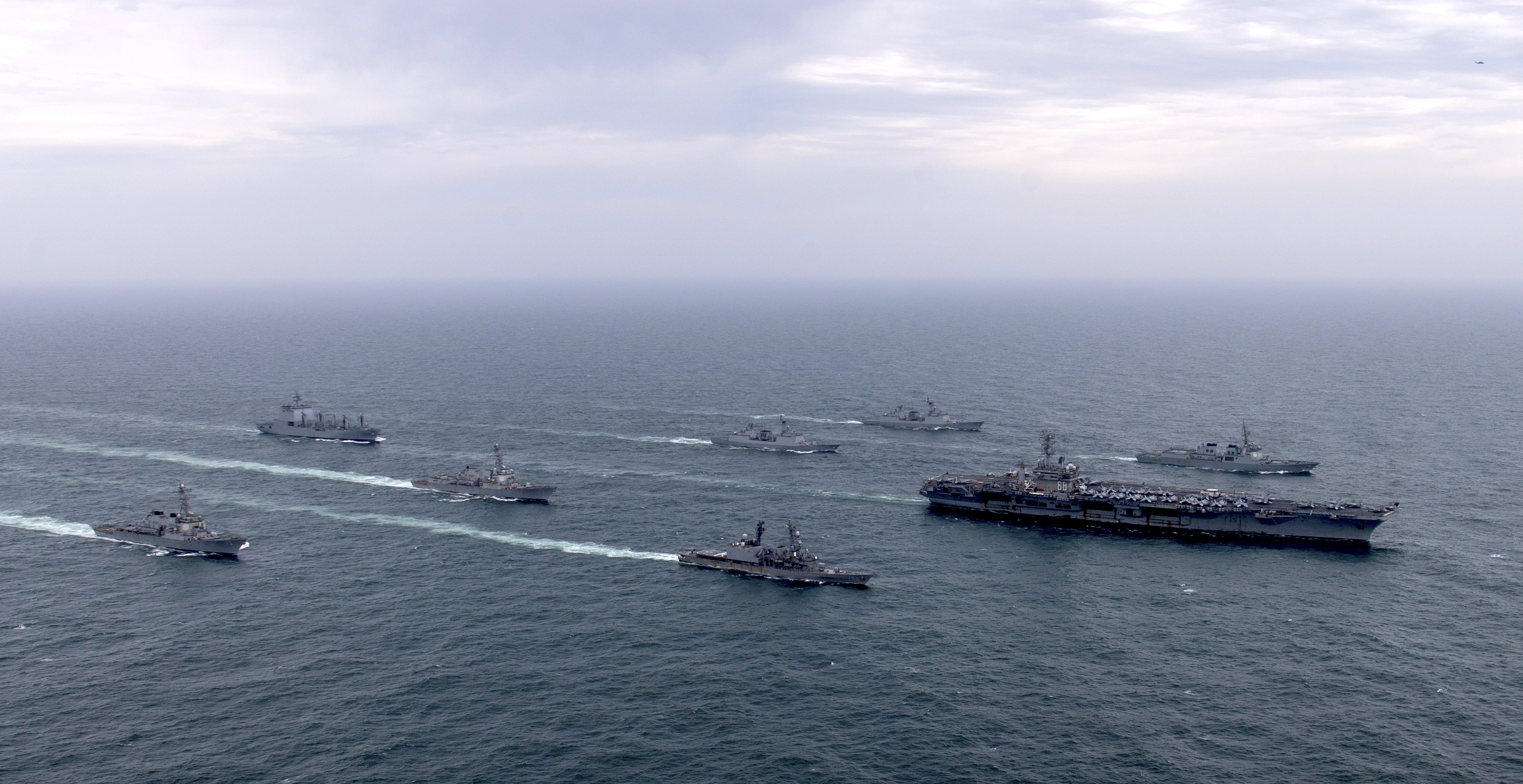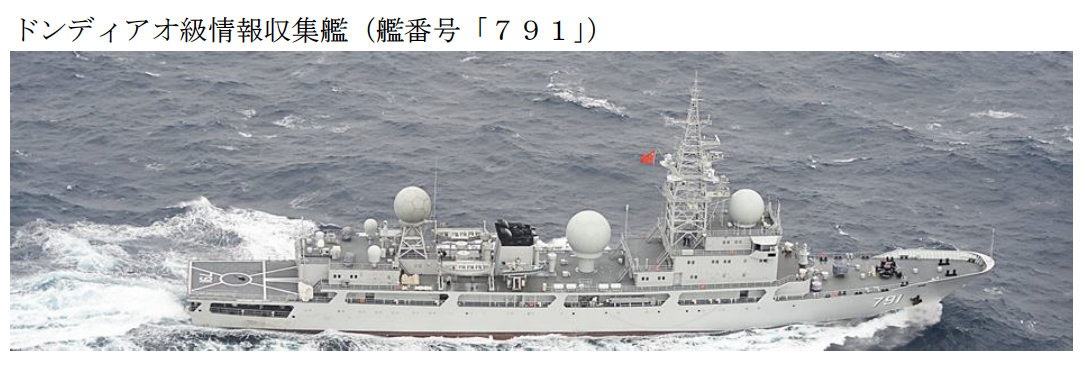USS Nimitz (CVN-68) steams in formation with the Japan Maritime Self-Defense Force (JMSDF) Asagiri-class destroyer JS Umigiri (DD 158), Republic of Korea (ROK) Great-class destroyer ROKS Yul Gok Yi (DDG 992), Chungmugong Yi Sun-Shin-class destroyers ROKS Dae Jo young (DDH 977) and ROKS Choi Young (DDH 981), So Yang-class fast combat support ship ROKS So Yang (AOE 51), and the Arleigh Burke-class guided missile destroyers USS Decatur (DDG-73) and USS Wayne E. Meyer (DDG-108) during a trilateral photo exercise on April 4, 2023. US Navy Photo
The Nimitz Carrier Strike Group drilled with the Republic of Korea Navy and Japan Maritime Self-Defense Force in the East China Sea this week, while the Makin Island Amphibious Ready Group wrapped up its participation in Exercise Ssang Yong 2023 in Korea. Meanwhile, search and rescue efforts are ongoing around Japan’s southwest islands for Japan Ground Self-Defense Force personnel aboard a JGSDF UH-60JA Blackhawk helicopter, which is believed to have crashed there on Thursday.
From Monday to Tuesday the Nimitz CSG – including USS Nimitz (CVN- 68) with embarked Carrier Air Wing (CVW) 17, destroyers USS Decatur (DDG-73) and USS Wayne E. Meyer (DDG-108) – conducted combined operations with ROKN destroyers ROKS Yulgok Yi I (DDG-992), ROKS Dae Joyeong (DDH-977) and ROKS Choe Yeong (DDH-981), replenishment ship ROKS Soyang (AOE-51) and JMSDF destroyer JS Umigiri (DD-158). The combined operations included anti-submarine warfare exercises, search and rescue drills, and staff embarkations, according to a. U.S. Navy news release issued on Tuesday.
“The U.S., Japan, and Korea are three maritime nations who share a vision for a free and open Indo-Pacific by working together to develop mutual trust, partnership, and capability,” Rear Adm. Christopher Sweeney, commander of Carrier Strike Group 11, said in the release. “Participation in exercises like these are a tangible symbol of a shared goal in ensuring regional stability and economic well-being for all nations.”
The anti-submarine warfare training in the trilateral drills comes six months after a previous drill in September 2022, according to a Monday news release from the Korean Ministry of National Defense. The goal of the drills was to improve the three countries’ response capabilities to underwater threats like North Korean submarine-launched ballistic missiles. The countries used the U.S. and ROKN navies’ MK 39 Expendable Mobile Anti-Submarine Warfare Training Target (EMATT) for the drills.
The Nimitz CSG left the ROK port of Busan on Sunday, having docked there on March 28 for a port visit. Umigiri and the Nimitz CSG, with cruiser USS Bunker Hill (CG-52) rejoining the CSG at th at point, conducted tactical exercises from Tuesday to Thursday in the East China Sea and the Pacific Ocean, according to a Thursday news release from the JMSDF.
This week, the Makin Island Amphibious Ready Group – made up of USS Makin Island (LHD-8), USS Anchorage (LPD-23) and USS John P. Murtha (LPD-26) and the embarked 13th Marine Expeditionary Unit – wrapped up Exercise Ssang Yong 2023 with a closing ceremony in Busan. The amphibious and naval drills between the Makin Island ARG and the ROKN and the ROK Marine Corps began on March 23 and involved 28,000 Korean and U.S. sailors and marines, 30 warships, 70 aircraft and 50 amphibious assault vehicles, according to a news release Makin Island. The ARG’s flagship subsequently dropped into Sasebo for a port visit before departing on Wednesday, according to a U.S. Navy news release issued that day.

USS Makin Island (LHD-8) stands moored with Japan Maritime Self-Defense Force ships during a scheduled port visit at Commander, Fleet Activities Sasebo April 5, 2023. US Navy Photo
A detachment from the United Kingdom’s Royal Marines Commandoes also joined in the exercise. The Royal Marine Commandoes will conduct further deployments throughout the Indo- Pacific following their participation in Ssang Yong 2023, the U.K. Royal Navy announced.
Their role in the exercise “..comes ahead of further deployments of Royal Marines across the Indo-Pacific – including exercises in Australia this summer – as part of ongoing Royal Navy efforts in the strategically important region, where the security situation is often challenging and complex,” reads a statement from the RN.
Over the last year, Royal Marines have been attached to the 13th MEU, according to the release. Their time in Australia is likely to include participation in the Australia-U.S amphibious and naval joint exercise Talisman Sabre slated for July 21 through Aug. 4. That exercise will likely include participation from partners and allies of both countries. The commanding officer of 40 Cdo, Lt. Col. Oliver Denning, visited the JGSDF Amphibious Rapid Deployment Brigade on Tuesday, according to the ARDB’s social media.
Offshore patrol ships HMS Tamar (P233) and HMS Spey (P234) have been on a long-term deployment across the vast region since late 2021, working with island communities and forging deeper bonds with allies and partners, according to the RN release. Tamar is currently conducting engagement activities in India, while Spey arrived in Darwin, Australia on Monday for engagements there.
Meanwhile search operations are ongoing around Miyako Island for 10 missing JGSDF personnel aboard a UH-60JA Blackhawk helicopter, which is believed to have crashed on Thursday. Among the missing personnel included the commander of the JGSDF’s 8th Division, Lt. Gen. Yuichi Sakamoto.
In a Friday morning press conference, Defense Minister Yasukazu Hamada said the helicopter disappeared from radar at 3:56 p.m. local time on Thursday while flying around Miyako Island. On the day of the accident, four Self-Defense Force aircraft, three naval vessels and a Japan Coast Guard patrol vessel conducted a search. Around 6:30 p.m., a Coast Guard patrol vessel discovered what appeared to be aircraft equipment.
Two Japan Maritime Self-Defense Force vessels, eight SDF aircrafts and four JCG ships are now reportedly searching the area, while the JCG has released photos showing recovered aircraft debris and unused lifeboats from the missing helicopter. The JGSDF has grounded all its UH-60JA helicopters following the accident. Japan has been steadily increasing its military presence and activities in the southwestern islands due to China’s increasing activities in the waters there, with the Miyako Strait serving as a regular transit route between the East China Sea and the Pacific Ocean for People’s Liberation Army Navy (PLAN) ships. Japan’s increased military activity also comes amid China’s ongoing claims and activities around the disputed Senkaku islands held by Japan.
The Joint Staff Office (JSO) of Japan’s Ministry of Defense issued two releases on Thursday about the movement of PLAN ships around Japan. On Wednesday at 10 p.m., the JMSDF sighted PLAN frigate CNS Anyang (599) sailing northwest in an area 50 miles south of Yonaguni Island, with the PLAN frigate subsequently sailing north in the waters between Yonaguni Island and Taiwan. It was then sighted on Thursday sailing north in an area 50 miles west of Uotsuri Island. A JMSDF P-1 Maritime Patrol Aircraft (MPA) of Fleet Air Wing 1 based at JMSDF Kanoya Air Base, Kyushu and a JMSDF P-3C Orion of Fleet Air Wing 5 based at Naha Air Base, Okinawa monitored the PLAN frigate, according to the release, which also noted that Anyang sailed south through the Miyako Strait on Monday.
On Wednesday at 11 p.m., PLAN Dongdiao-class intelligence ship Beijixing was sighted south in an area 38 miles west of Kume Island and on Thursday transited the Miyako Strait to sail into the Pacific. Destroyer Umigiri, along with JMSDF P-1 MPA of Fleet Air Wing 1 Kyushu and a JMSDF P-3C Orion of Fleet Air Wing 5 shadowed the PLAN ship, according to the release.
Meanwhile, in Australia, amphibious assault ship HMAS Canberra (L02) returned to Townsville on March 31 after completing Operation Vanuatu Assist 23, the Australian government’s operation to provide Humanitarian Assistance and Disaster Relief and reconstruction support to Vanuatu following tropical cyclones there. Canberra had been operating in Vanuatu since March 5.












No comments:
Post a Comment
How did you like the post, leave a comment. I would appreciate hearing from you all. Best wishes from JC's Naval, Maritime and Military News